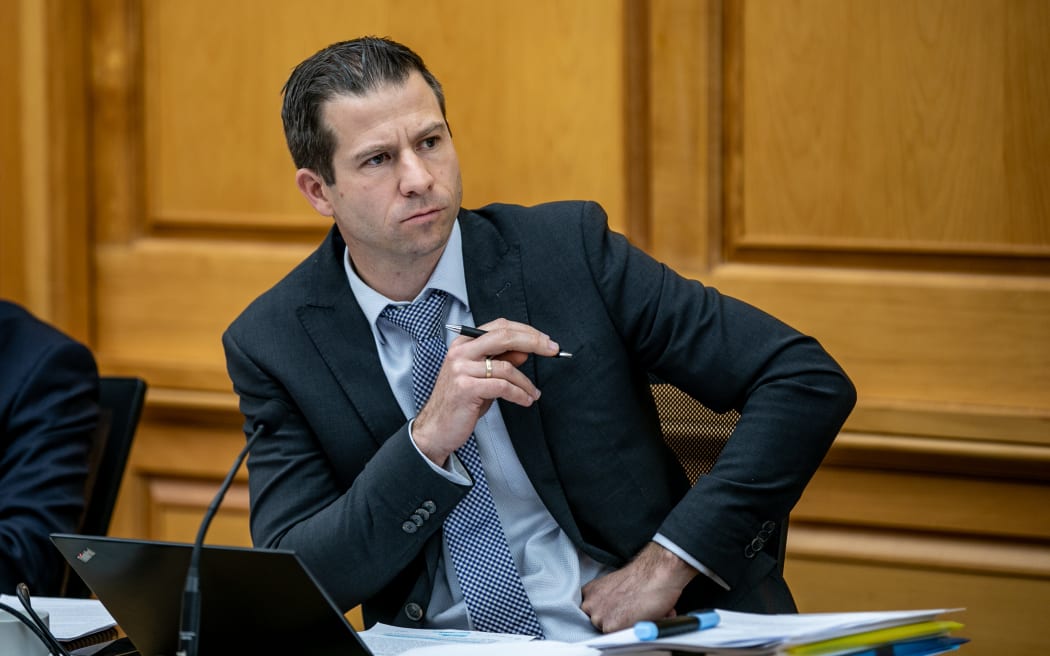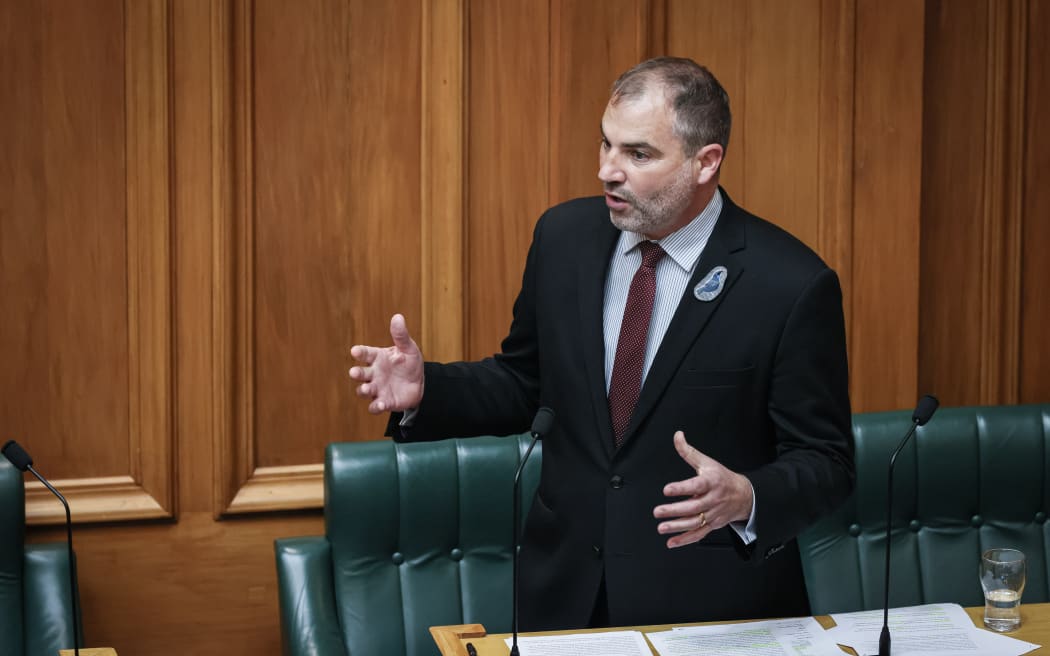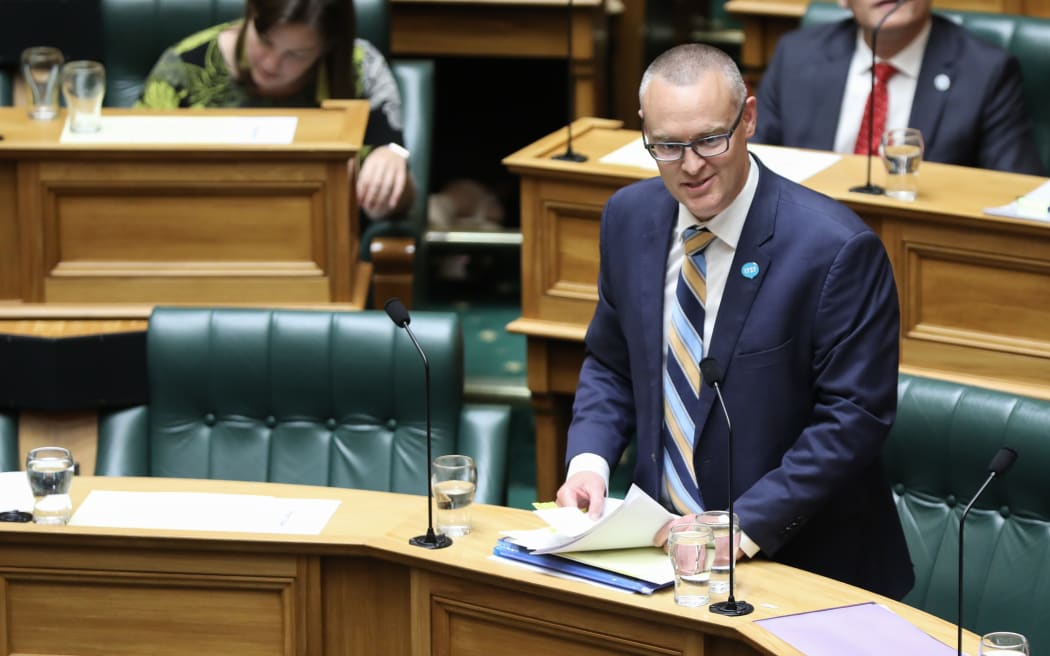Evidently it takes a private bill to bring MPs around to a more mellow and reflective style of debate.
That's probably because there's usually something deeply personal in the way private bills are about law change that addresses a very specific matter particular to just one person.
Such is the case with the Annie Oxborough Birth Parents Registration Bill in the name of National MP Chris Penk which had its first reading last night.

National MP Chris Penk questions a Minister during an estimates hearing Photo: VNP / Daniela Maoate-Cox
"Annie Oxborough was adopted as a child, and the identity of her birth parents was removed from her—young and unmarried as they were—just as she was physically removed from them. Annie has subsequently formed a relationship with her birth parents, and is seeking now to have their names added to her legal birth certificate to formally register her biological and legal parentage," Penk explained.
"As it happens, her original birth certificate, pre-adoption, did not include the name of her biological father, as this was not provided at the time of her birth. In any case, neither Annie's original birth certificate nor her legal post-adoption birth certificate provide a true and accurate account of her lineage. This private bill would rectify the issue and provide to Annie the right to have your biological heritage reflected on her birth certificate,” he said, adding that Annie Oborough's biological parents have consented to this step being taken."
You may be wondering if this birth certificate gap was not something that could simply have been fixed with the stroke of a pen at the Births, Deaths and Marriages office. But according to Penk, this Bill is the only legal mechanism that exists by which Annie can achieve this outcome.
“The way that the bill would do this is to instruct the registrar-general to record the names of Annie's biological father and mother on her birth certificate as her two parents, in accordance with section 24 of the Births, Deaths, Marriages, and Relationships Registration Act 1995."
In this respect, the MP pointed out that, his legislation is similar to another recent private bill, which resulted in the Paige Harris Birth Registration Act 2022, when MPs came together to address a technical injustice which speaks to the heart of a person's identity or whakapapa.
MPs open up
The debate was a rare example of accord among MPs across the political divide - a welcome break from the usual arguing and points-scoring - the sort of harmonious atmosphere in which MPs can open up about their own lives, such as Labour’s Glen Bennett.
“Now, in my family, my mother was adopted and has been through the experience of searching, looking for her birth parents. It was a different time. My mother was born in the early 1940s, and it wasn't until her mid-30s that she actually started looking to see if she could find her birth parents. It wasn't until later on that she was able to find her birth mother, but no record of her birth father," Bennett told the chamber.
"So for me, I have, I guess, in a different way lived through the challenges of what was back in the day closed adoption and the challenges that closed adoption brought. And also around the feeling, often, of the State, of church organisations that for some reason thought the best idea for a child was for them not to know their lineage, not to know their whakapapa, not to know the history of who they are.”

Labour MP Glen Bennett speaking in Parliament's debating chamber Photo: Phil Smith
Labour’s David Clark also had a personal story to relay about his mother.
“Later in her life, after her adoptive mother had died, her adoptive father shared with her some information about her adoption that was sufficient for her to trace some of that history and reconnect with her birth mother—the last name of her birth mother, the age which the mother was when she was born, and in which town she was living at the time or registered in. With that information and a good deal of detective work, going through both births, deaths, and marriages, processes, newspaper articles, and the like—I can remember travelling as a child around the South Island with my parents as they did the detective work, essentially, to find that connection. Then, eventually, that lead to a reconnection with my mother's birth mother, who then I, as a child, came to know and developed a connection with.
“That was pretty special. I know it's very, very important to my mother, for her identity and for that connection, to understand everything from medical history right through, but also, you know, where certain personality traits come from or other connections, coincidences—it's all tied up with identity.”
Broader reform needed
Penk and other MPs say a broader look at this area of law and policy is needed. As the ACT Party’s James McDowell noted, there are many others in similar circumstances as Annie Oxborough.
“It's not particularly reasonable to say that for every single person—that legislation on a per-person basis is the answer long term. Certainly, there probably needs to be some law changes here,” he said during the debate.
“It's particularly important around historical adoption in the "baby scoop" era, where it says that at one point 76 babies were being given away each week in New Zealand. Historically, over 100,000 adoptions have taken place, and those children—now adults—don't have that legal right to actually have the biological parents put on their birth certificate. So here we are, in Parliament, doing a bill like this.”
The Government MP Rachel Boyack said work was being done on law reform in this area. She and others speaking on this first reading of the Bill were unanimous that supporting it was the right thing to do.

Labour MP Dr David Clark in the House Photo: VNP / Phil Smith
After a harmonious debate in which we learnt quite a bit more about several MPs and their backgrounds, the Bill passed its first reading unanimously. MPs were now free to return to attacking each other.

